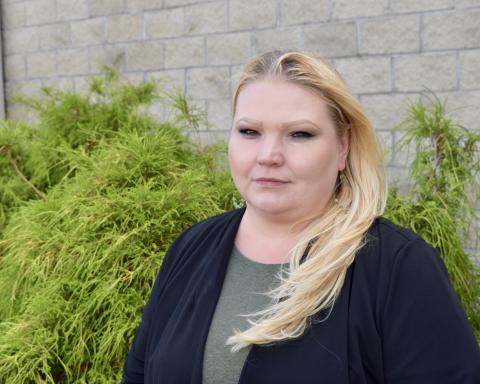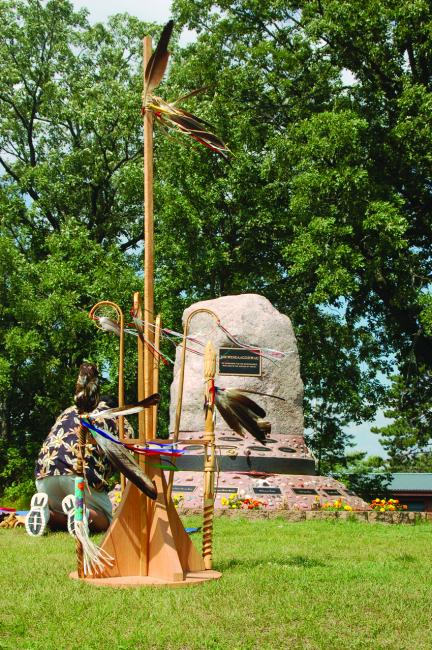Administration plays a pivotal role in supporting the organization’s overall operations, mission, and relationships with member tribes. The talented staff not only ensures the smooth and successful execution of annual summer events but also facilitates stronger connections within tribal communities through these efforts. This division, which includes Accounting, IT, and HR, collaborates closely with the Executive Administrator and Deputy Administrator to manage daily functions and uphold high-level operations. By providing essential support for funding, financial transactions, technology infrastructure, and workforce management, Administration strengthens both the organization's internal efficiency and its partnerships with member tribes.

Executive Administrator
As Executive Administrator, Jason Schlender, Manidoo Noodin, tribal member of Lac Courte Oreilles, is charged with securing resources, protecting capacity, and empowering staff through leadership to carry out the priorities of the Board of Commissioners, Voigt Intertribal Task Force, and the Great Lakes Indian Fisheries Committee. works with tribal governance and staff to carry out the goals of GLIFWC's member tribes.

Deputy Administrator
Julianna Saari, a member of the Red Cliff Band of Lake Superior Ojibwe, serves as the Deputy Administrator at GLIFWC. In this role, she is instrumental in supporting the leadership of the organization by overseeing operations, managing staff, and implementing policies and programs. Julianna is also involved in budget management, strategic planning, and facilitating communication across teams to drive performance and ensure the achievement of organizational objectives.

Executive Assistant
Jenny Krueger-Bear, Red Cliff tribal member, does her best to fill the executive assistant position. She provides support to the Executive Administrator by managing schedules, coordinating meetings, and handling correspondence. They play a key role in organizing the annual Healing Circle Run/Walk, the Mikwendaagoziwag Ceremony, and the Partners Fishing Event as well as other cultural/organizational events. She also handles meetings and communications with the Board of Commissioners and the Great Lakes Indian Fisheries Committee also known as the Lake Committee. Other duties she assists with include: the annual BIA contract submission and annual report, annual courts and registration subcontracts, and routine all staff communication.
The Accounting Team is vital to the organization’s financial health and long-term success. This dedicated team expertly manages all financial resources, with a strong focus on securing and expanding funding from the Department of Interior's Bureau of Indian Affairs through the Indian Self-Determination and Education Assistance Act. Additionally, the team actively seeks to diversify funding sources, ensuring a robust financial foundation to support the mission. Led by a commitment to excellence, the team strives for flawless audits, continually achieving low-risk results with zero findings. This relentless focus on financial integrity strengthens GLIFWC's ability to grow and thrive.
Human Resources is committed to attracting, retaining, and supporting a skilled and dedicated workforce that understands and serves the needs of tribal communities. It is focused on creating a positive, respectful, and safe work environment while encouraging professional growth and advancement opportunities for all employees.
Coming soon
The Information Technology team is dedicated to leveraging technology to enhance the organization’s operations and support its mission. Priorities include improving efficiency, communication, and data management across all divisions, while ensuring employees have the tools and training needed to work effectively and safely.

The Mikwendaagoziwag Memorial honors the memory of over 400 Anishinaabe lives tragically lost in the fall and winter of 1850-1851 during the attempted removal known as the Sandy Lake Tragedy. This dark chapter in history began when the U.S. government hatched an ill-conceived plan to relocate the Ojibwe people from their homelands in Wisconsin and Michigan to Minnesota by requiring them to travel to Sandy Lake for their annuity payments. Thousands of Ojibwe were subjected to dangerous conditions, inadequate provisions, and the harsh onset of winter. Many perished from starvation, exposure, and disease.
The memorial stands not only as a somber reminder of this tragic event but also as a symbol of the strength, resilience, and survival of the Anishinaabe people. It serves to educate current and future generations about the historical injustices faced by the Ojibwe and honors the enduring spirit of the Anishinaabe communities that continue to thrive. Located on the shores of Sandy Lake, the site is a place for reflection, remembrance, and cultural preservation. Through ongoing efforts, the Sandy Lake Memorial promotes healing and ensures that the legacy of the Anishinaabe remains firmly rooted in both the past and the future.
See these short films to learn more.
The annual Healing Circle Run/Walk began in 2001, and serves as a collective prayer for healing, inspired by the teaching that healing starts with the individual and extends to families, communities, nations, and ultimately Aki (the Earth). This event brings participants together to pray for the healing of themselves, their loved ones, and the environment. The run/walk connects ten Ojibwe reservations across northern Wisconsin, Michigan, and Minnesota, spanning seven days and concluding at the Lac Courte Oreilles Reservation during the Honor the Earth pow wow. It symbolizes unity and healing on multiple levels—from personal to planetary.
This short film centers on the Healing Circle Run. In 1989, the Anishinaabe Solidarity Relay began as a response to the resounding racism and hatred directed towards Ojibwe people throughout the region at boat landings and other communal spaces.
The annual Partners in Fishing Event, established in 1993, promotes trust and cooperation between tribal, state, and federal natural resource managers, while reinforcing long-term relationships and easing tensions among agencies. This event supports GLIFWC's mission by recognizing tribal fishing rights and conservation efforts through co-management of fishery resources in the ceded territories. Led by the Wisconsin Joint Assessment Steering Committee, attendees, including key agency officials, engage in formal and informal interactions, with activities like guided fishing trips and motivational talks from community leaders and former Green Bay Packers players, who share strategies in teamwork.
Make a Tax-Deductible Donation
GLIFWC is a 501(c)(3) nonprofit organization. Donations are tax-deductible and will directly support our mission. Thank you for making a difference!